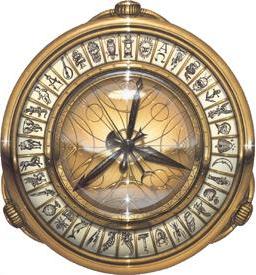And they are.
The brilliant thing about His Dark Materials is the way it doesn't follow all the standard cliches of the fantasy genre. There are no elves or dwarfs, no dragons, no great wizards throwing fireballs around. To me, it seemed more inspired by fairy tales than traditional Tolkien-esque fantasy. The best part is that when Pullman does take some standard fantasy cliche (like witches or angels), he mutates them into something entirely different. At the same time, Pullman infuses his stories with a certain amount of realism. Very little of the fantasy is over the top in a way that causes one to question it. Taken together, these aspects of the story give the reader the impression that Pullman's version of the old standbys are truer than those that we've taken for granted; his witches are what witches are really like and everything else is just the embellishment that comes with centuries of legends. Nevermind that those legends began millenia before Pullman was born.
 I can't say I loved the ending, though. Considering the whole series is about trying to understand this mystical substance called Dust, it was a little annoying to finish the book without a true grasp of what exactly it is. I still don't understand exactly why Dust leaving the world is so bad, except for the strange alien race that relies on the Dust to survive. I'm still trying to grok the books, and I don't want to give away too much for people who haven't read it yet, so I think I'll stop talking about it now.
I can't say I loved the ending, though. Considering the whole series is about trying to understand this mystical substance called Dust, it was a little annoying to finish the book without a true grasp of what exactly it is. I still don't understand exactly why Dust leaving the world is so bad, except for the strange alien race that relies on the Dust to survive. I'm still trying to grok the books, and I don't want to give away too much for people who haven't read it yet, so I think I'll stop talking about it now.In my efforts to really get the series, I've decided to read Milton's Paradise Lost. The trilogy's title comes from a line in Paradise Lost, and Pullman cites the epic poem as one of his greatest influences. Generally, I find that most artists aren't really self-aware when it comes to listing their influences, but I figured now was as good a time as any to read a book that's kinda part of the western canon, even if it isn't part of the Lit Hum syllabus.
Conveniently coinciding with this decison, this morning I found a really cool website called dailylit.com. Basically, they took a huge number of awesome books from the public domain and then set up a system that allows you to pick a book (or more than one, if you're hardcore) and get bite-sized sections of that book emailed to you daily (or less than daily if you aren't so hardcore). I think it's a really good way to read one of those books you've been meaning to read without stressing out about it. After all, it only takes 5 minutes to read one day's section, but it also keeps you going by sending new ones each day.
I've already signed up for daily emails of Paradise Lost. If anybody (do I even have any readers yet?) wants to join in, I'd love to have someone(s) to discuss the poem with.

1 comment:
The Paradise Lost thing sounds neat...I'll start up, if you're still continuing. In relation to "His Dark Materials", I think the connection is mostly in the giant slap-you-in-the-face Adam and Eve metaphor, and floofy metaphysical stuff about innocence and souls and there being a big godsicle somewhere.
Post a Comment